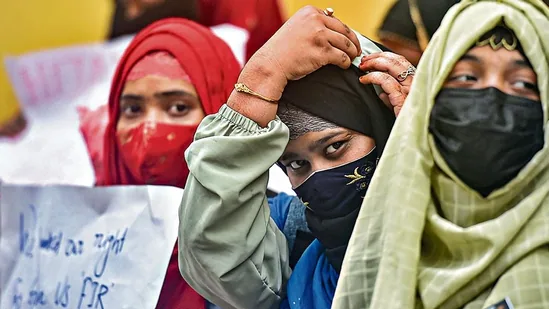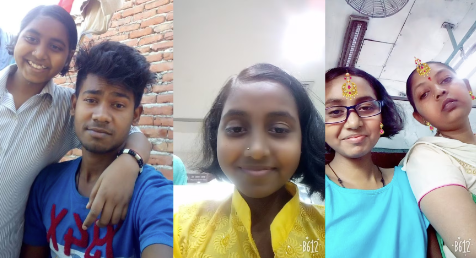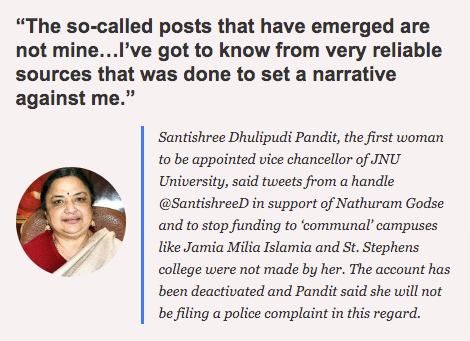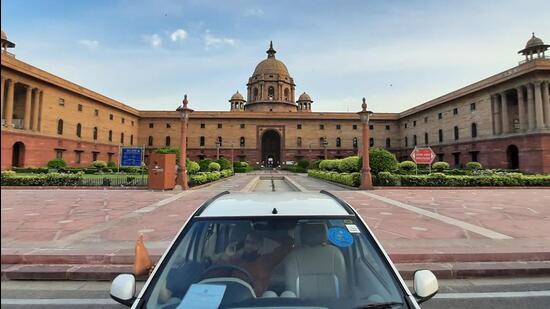
What began as a local issue with six high school girls in Udupi insisting on wearing a head scarf over their uniforms to class has now escalated into a full-blown national row that has landed in the Supreme Court.
On Friday, the apex court refused to hear petitions against an interim Karnataka high court order which states that no religious garments will be allowed in classes until it reaches a final verdict.
“Don’t spread these things to a larger level,” Chief Justice of India N.V. Ramana said. “You [should] also think whether this is proper to bring such things to a national level.”
A three-judge bench headed by Karnataka high court chief justice Ritu Raj Awasthi had earlier restrained students from wearing any sort of religious dress, regardless of their faith, until it reaches a decision on petitions filed by Muslim girl students who say that wearing a headscarf is their fundamental right guaranteed by the constitution.
The petitions had been filed before a single-judge bench of Justice Krishna Dixit, but on Wednesday, a day after he began the hearings, he said there were constitutional issues to be examined and referred the matter to the chief justice and a larger bench.
“This is not just a case of essential religious practice. This is also a case of essential education of the girl child,” advocate Sanjay Hegde had told the court.
The matter will continue to be heard by the larger Karnataka high court bench on February 14.
[Read Utkarsh Anand on the legal tussle on the hijab row here.]
How did we get here?
Although the Karnataka high court’s interim order applies to all faiths, it effectively mitigates against the Muslim students who continue to be left out of classes because their school administration believes that wearing a head scarf violates uniform rules. It was precisely to seek relief from this denial of education for expressing what they say is an essential practice of their faith that the girls had approached the court in the first place.
Until the court reaches a final verdict these girls must now choose: faith or education.
The row began on December 28, when a government-run pre-university college in Udupi sent six girls out of the classroom for wearing head scarves over their uniforms.
By early February, as many as five educational institutions had denied entry to hijab-wearing women. On Thursday, a private institution in Jaipur called in the police when some girls turned up in a burqa.
The issue quickly snowballed as the protest spread to other colleges and cities, polarising students into two camps: the hijab wearers and their supporters and those in saffron scarves.
The situation took an ugly turn when a video of Muskan Khan, a hijab-wearing student who arrived at her college driving her scooter, was heckled by scores of slogan-shouting men wearing saffron scarves. The girl stood her ground, shouting a defiant Allahu-Akbar in response to the chants of Jai Shri Ram.
Political row
After the heckling video went viral, Karnataka announced the closure of schools and colleges for three days until February 11 with chief minister Basavaraj S Bommai making an appeal for ‘peace and harmony’.
BJP MP for Mysore-Kodagu Pratap Simha was more blunt: “You can wear hijab, burqa…and can go to a madrassa.”
At two virtual political rallies in Uttar Pradesh, Prime Minister Narendra Modi said attempts were being made to instigate Muslim women. Without referring to the hijab controversy, he accused the Opposition of hampering the progress of Muslim women.
But Congress leader Rahul Gandhi said India’s daughters are being ‘robbed’ of their future with the government letting hijab come in the way of their education. Two days later Priyanka Gandhi added that the constitution gave women the right to decide what they wanted to wear.
That the controversy is being fanned by political elements is not in doubt. Saffron scarves and turbans are being distributed to students by the Bajrang Dal and Hindu Jagrana Vedike, students have said.
But the Muslim students in hijab have the support of the Campus Front of India which supported the girls in approaching the Karnataka high court.
It seems clear that the row is no longer about hijab—or perhaps never was. This is evidently a political battle with schoolgirls being used as pawns.
REST IN POWER
Lata Kumari, 18, organ donor

She loved chow mien and samosas. Couldn’t get enough of Taarak Mehta ka Ulta Chasma, and held on to the paintings she had made before she fell ill and had to discontinue her studies six years ago, said her mother Divya Devi. On February 8, 18-year-old Lata Kumari had a brain seizure and doctors at AIIMS declared her brain dead.
“I always thought I would donate my organs after my death,” says Devi, who works at a garment factory and has been her daughter’s sole care-giver since she fell ill. When she would take her daughter from home in Ghaziabad to AIIMS for treatment, Devi would notice posters advocating organ donation. “I told my family to donate my organs after my death,” she said. Little did she realise that she’d be donating her daughter’s.
Lata’s heart, liver and both kidneys have gone to four recipients, giving them a new lease of life. “I couldn’t do her kanyadaan, but at least I could do her angdaan,” said her mother.
Gender Tracker
Manipur’s missing women candidates
Polling begins in Manipur on February 28 but despite a ratio of 1,060 women for every 1,000 male registered voters, the contest for 60 seats will see just nine women candidates out of 181.
These include:
Congress: Three
BJP: Three
National People’s Party: Two
JD(U): One
Quote/Unquote

WATCH

Writing with Fire, a film about the journey of Dalit-women run news organisation, Khabar Lahariya has been nominated for best documentary feature at the Oscars. Directed by Rintu Thomas and Sushmit Ghosh, the film premiered at the Sundance Film Festival, 2021 but has not yet been shown in India.
Watch the trailer here
STORIES YOU MIGHT HAVE MISSED
Judge reinstated

After she complained of sexual harassment by a then sitting judge of Madhya Pradesh High Court, a woman additional district judge was transferred from Gwalior to Sidhi even though she requested that the transfer be deferred by eight months since her daughter had her Board examinations. When her request was denied, she quit.
Now, a two judge Supreme Court bench of Justices L Nageswara Rao and B.R. Gavai has ruled that her resignation was under ‘unbearable circumstances’ since the transfer was in contravention of the transfer policy. “It appears that in a gruesome battle between a mother and a judicial officer, the judicial officer lost the battle,” the judges said. The woman additional judge was represented by senior advocate Indira Jaising.
Now, Haryana to have a love jihad law
The Haryana cabinet has approved a draft Prevention of Unlawful Conversion of Religion Bill which is set to be tabled in the assembly during the upcoming session that begins on March 2. At present the ‘love jihad’ law, as it’s colloquially known, is present in four BJP-ruled states including Uttar Pradesh, Uttarakhand, Himachal Pradesh and Madhya Pradesh. Gujarat too is mulling such a law while the BJP says it will introduce more stringent punishments in Uttar Pradesh.
Read Shruti Tomar’s story on how the law is disproportionately skewed towards booking Muslims and Christians.
Army no to Onir’s script

As scripts go, the real life story of a gay major who quit the Indian army because it was no longer tenable for him to continue, was juicy enough for Onir, the national-award winning director of I am. Because it was based on the army, Onir was required to get clearance. On December 16, the film maker got a reply. No.
On Friday, Parliament was told that the film which sought to portray a romantic relationship between a soldier and a Kashmiri man would show the army in ‘poor light’ and raise ‘security issues’. The explanation came in response to a question raised by BJP MP Varun Gandhi.
YOU CAN’T MAKE THIS UP
The GAY code assigned to Gaya airport in Bihar is ‘inappropriate, unsuitable, offensive/embarrassing’ a Parliamentary panel has said and has asked the government to change it to YAG or something more ‘appropriate’.
AROUND THE WORLD
Rio takes the blame…
Mining giant Rio Tinto is facing up to a toxic workplace culture of bullying, sexual harassment and racism. An external investigation commissioned by Rio found that half the employees had experienced bullying over the past years and a third of female workers said they had been sexually harassed.
The finding has been published on its website, in what The Economist calls an ‘admirably open attempt to face up to a toxic culture’.
…While NFL grapples with it
More than 30 women who worked for the National Football League (NFL) have described a stifling corporate culture that demoralized some and drove others to quit. This culture persisted despite a promise from NFL Commissioner Roger Goodell in 2014 that the league would take a stricter stance on domestic violence and sexual assault, the women told The New York Times. Days before the Super Bowl on Sunday, two former employees of the Washington Commanders accused team owner Daniel Snyder of inappropriate sexual contact. “Everything’s excused in the name of football,” digital media reporting analyst Alyssa Leeds who quit NFL in 2019 told the paper.
‘Misunderstanding’ says Peng Shuai

In her first interview with western media since she publicly accused retired Chinese vice-premier Zhang Gaoli of sexual assault, tennis star Peng Shuai told French sports daily L’Equipe that the issue was a ‘huge misunderstanding’. The interview was conducted in the presence of a Chinese Olympic official. Following the accusation made in a social media post—since removed—in November, the former doubles world number one was not seen for weeks.
BEFORE I GO…

People with disabilities are often left out of the conversation when it comes to sexual pleasure. This Valentine’s Day, Agents of Ishq and Point of View (POV) will launch their video on self-pleasure for people with disabilities. The launch is preceded by a discussion on Sunday, February 13 at 7 pm, where Paromita Vohra who has directed the video and writer and performer Sweta Mantrii will speak with sex educator Leeza Mangaldas.
Watch on Instagram at @povmumbai.
| Were you forwarded this email? Did you stumble upon it online? Sign up here. |
| That’s it for this week. If you have a tip or information on gender-related developments that you would like to share write to me at: namita.bhandare@gmail.com. |



